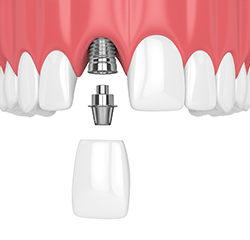
A dental implant is an artificial tooth root that is placed into your jaw to hold a replacement tooth or bridge. Dental implants may be an option for people who have lost a tooth or teeth due to periodontal disease, an injury, or some other reason.
Are you a candidate for dental implants?
The ideal candidate for a dental implant is in good general and oral health. Adequate bone in your jaw is needed to support the implant, and the best candidates have healthy gum tissues that are free of periodontal disease.
Dental implants are intimately connected with the gum tissues and underlying bone in the mouth. Since periodontists are the dental experts who specialize in precisely these areas, they are ideal members of your dental implant team. Not only do periodontists have experience working with other dental professionals, they also have the special knowledge, training and facilities that you need to have teeth that look and feel just like your own. Your dentist and periodontist will work together to make your dreams come true.
What is a dental implant procedure like?
This procedure is a team effort between you, your dentist and your periodontist. Dr. Aldo Sordelli and your dentist will consult with you to determine where and how your implant should be placed. Depending on your specific condition and the type of implant chosen, your periodontist will create a treatment plan tailored to meet your needs.
Single Tooth Dental Implants
If you are missing a single tooth, one implant and a crown can replace it. A dental implant replaces both the lost natural tooth and its root.
What are the advantages of a single-tooth implant over a bridge?
A dental implant provides several advantages over other tooth replacement options. In addition to looking and functioning like a natural tooth, a dental implant replaces a single tooth without sacrificing the health of neighboring teeth. The other common treatment for the loss of a single tooth, a tooth-supported fixed bridge, requires that adjacent teeth be ground down to support the cemented bridge.
Because a dental implant will replace your tooth root, the bone is better preserved. With a bridge, some of the bone that previously surrounded the tooth begins to resorb (deteriorate). Dental implants integrate with your jawbone, helping to keep the bone healthy and intact.
In the long term, a single implant can be more esthetic and easier to keep clean than a bridge. Gums can recede around a bridge, leaving a visible defect when the metal base or collar of the bridge becomes exposed. Resorbed bone beneath the bridge can lead to an unattractive smile. And, the cement holding the bridge in place can wash out, allowing bacteria to decay the teeth that anchor the bridge.
Multiple Tooth Implants
If you are missing several teeth, implant-supported bridges can replace them. Dental implants will replace both your lost natural teeth and some of the roots.
What are the advantages of implant-supported bridges over fixed bridges or removable partial dentures?
Dental implants provide several advantages over other teeth replacement options. In addition to looking and functioning like natural teeth, implant-supported bridges replace teeth without support from adjacent natural teeth. Other common treatments for the loss of several teeth, such as fixed bridges or removable partial dentures, are dependent on support from adjacent teeth.
In addition, because implant-supported bridges will replace some of your tooth roots, your bone is better preserved. With a fixed bridge or removable partial denture, the bone that previously surrounded the tooth root may begin to resorb (deteriorate). Dental implants integrate with your jawbone, helping to keep the bone healthy and intact.
In the long term, implants are esthetic, functional and comfortable. Gums and bone can recede around a fixed bridge or removable partial denture, leaving a visible defect. Resorbed bone beneath bridges or removable partial dentures can lead to a collapsed, unattractive smile. The cement holding bridges in place can wash out, allowing bacteria to decay teeth that anchor the bridge. In addition, removable partial dentures can move around in the mouth and reduce your ability to eat certain foods.
Full Mouth Dental Implants
If you are missing all of your teeth, an implant-supported full bridge or full denture can replace them. Dental implants will replace both your lost natural teeth and some of the roots.
What are the advantages of implant-supported full bridges and implant-supported dentures over conventional dentures?
Dental implants provide several advantages over other teeth replacement options. In addition to looking and functioning like natural teeth, implant-supported full bridges or dentures are designed to be long lasting. Implant-supported full bridges and dentures also are more comfortable and stable than conventional dentures, allowing you to retain a more natural biting and chewing capacity.
In addition, because implant-supported full bridges and dentures will replace some of your tooth roots, your bone is better preserved. With conventional dentures, the bone that previously surrounded the tooth roots begins to resorb (deteriorate). Dental implants integrate with your jawbone, helping to keep the bone healthy and intact.
In the long term, implants can be more esthetic and easier to maintain than conventional dentures. The loss of bone that accompanies conventional dentures leads to recession of the jawbone and a collapsed, unattractive smile. Conventional dentures make it difficult to eat certain foods.
What can I expect after recieving a dental implant?
As you know, your own teeth require conscientious at-home oral care and regular dental visits. Dental implants are like your own teeth and will require the same care. In order to keep your implant clean and plaque-free, brushing and flossing still apply!
After treatment, Dr. Sordelli will work closely with you and your dentist to develop the best care plan for you. Periodic follow-up visits will be scheduled to monitor your implant, teeth and gums to make sure they are healthy.
